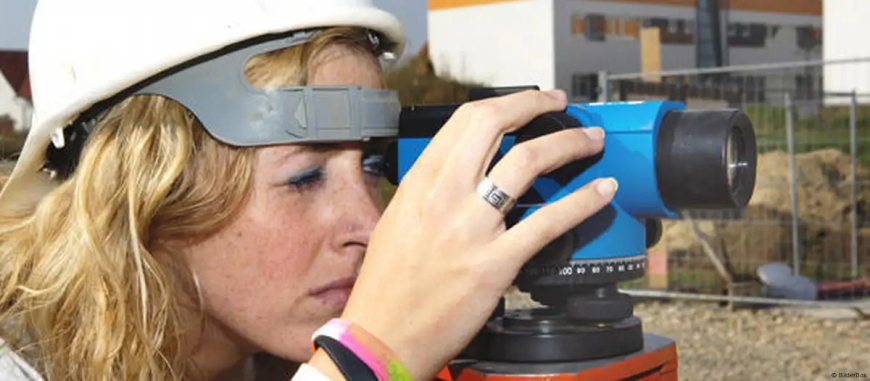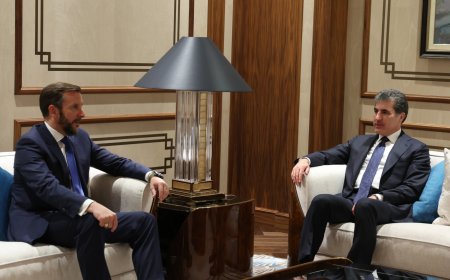Using tech, AI to make construction jobs appeal to women
Female construction workers often say they like their jobs because they can accomplish something tangible. And yet not many women work in the industry. New technologies could help change that.

Larissa Zeichhardt employs a robotic dog at her construction company — a four-legged machine equipped with various cameras and sensors to document the daily work done at the Berlin-based business LAT.
LAT specializes in laying high-voltage cables along railway tracks, and Zeichhardt says none of her 130 employees is really keen on getting back to the office to write down what's been done after a full shift on the construction site. But without proper documentation, the next shift wouldn't know exactly where the cables are located, she told DW.
This is where LAT's new robo-dog comes into play, as the high-tech mobile machine starts to roam along the tracks, records locations and transmits the data directly into a virtual 3D model of the structure, allowing human colleagues access to it.
This kind of automated data collection also helps prevent damage to the cables that eventually could lead to power outages and costly repairs if their exact location isn't known.
A 'sisterhood' of entrepreneurs
Zeichhardt and her sister Arabelle Laternser took over the medium-sized family business a decade ago after their father's sudden death. Their enthusiasm for modern technology, made them venture into digitally transforming the old-fashioned construction business.
Zeichhardt said the transformation was also partly born out of sheer necessity.
The electrical engineer by profession was pregnant when their father died, and her sister kept bringing new documents home for her to sign. Eventually, the pair grew tired of lugging around binders and decided to digitize the entire administration so they could work from anywhere.
The employees out in the field also use digital apps for documentation, tool management and work safety documents, which have since been consolidated in a construction-site database.
"Our working hours are tough," Zeichhardt told DW, and the administrative work often needs to be done at night, on weekends or during holidays. That's why she tries to relieve her team of paperwork wherever possible..
Construction still no job for women
The construction industry has a reputation for being dirty, loud, male-dominated and technologically conservative. Issues like high waste production and carbon emissions are persistent challenges.
The industry's biggest problem is the shortage of skilled labor. According to the German Construction Industry Association (HDB), a quarter of skilled construction workers will retire within the next decade. However, younger workers — especially women — are few and far between in the years to come.
The construction sector, according to HDB, has the fewest female employees in Germany, at just 14%. Even years of strong economic growth in the industry, with good earning potential, have not made much of a difference.
In trades that require heavy manual work such as bricklaying, road repair and underground construction, only 2% of workers are women — a figure that has barely increased for the past two decades, HDB data show. In planning and supervising projects, however, the proportion of women is a slightly better 28%.
After all, moving from construction site to construction site, which is part of the job, is hard to reconcile with family life. An internet campaign supported by the construction industry and called WIR.KÖNNEN.BAU in German (We can construction) seeks to attract more women to construction careers and calls for more flexible hours, child care support, and remote work options.
Despite being a "small company that doesn't invest heavily in recruitment," Zeichhardt said LAT received a number of "impressive applications" from women and young people. She attributed this to the company's modern image, which has already won awards for family-friendliness, and for projects with startups.
Never bothered by being 'the only women'
Bianca Weber-Lewerenz told DW that digitization and artificial intelligence (AI) are creating new roles for women in construction.
Weber-Lewerenz herself became the first female mason in the regional German state of Baden-Württemberg in 1997, just three years after then West Germany lifted its ban on women working on construction sites.
Having learned the bricklayer trade from the ground up helps the construction engineer — who now holds a PhD — convince entire workforces that construction, women and AI are a perfect match.
"Back then, crane technology relieved us from heavy physical work. It's the same with AI now," she said. "When I've laid pipes, I take a photo and send it to the billing department. Thanks to AI image recognition, they can immediately generate an invoice because the completed section is identified."
Such tasks — as well as taking measurements, planning and design — can be efficiently handled from a home office, she said. Though, she said, an architect or engineer must be on-site at times. "But the only question is how often and for how long."
Weber-Lewerenz said being the only woman among men never bothered her during her career. She said she remained friends with her former supervisor.
"The men were amazed to see the first female apprentice mason on a construction site. Little by little, they started trusting me with physically demanding tasks. Men respect women who can handle tough conditions outside in all weather and who have a plan."
Weber-Lewerenz said modern tools meant that contemporary construction requires much less muscle. As a mentor within the so-called Spitzenfrauen organization of top female leaders in Germany, she also advises female students interested in construction careers.
Making effective use of AI
Great hopes are being placed on BIM (Building Information Modeling) — a digital platform increasingly seen on German construction sites that gives all trades involved in a project access to documentation.
Weber-Lewerenz said BIM simplified communication and "prevents a lot of chaos and conflict."
"My focus is on identifying the tools that make sense for a company, that allow machines to take over heavy and monotonous tasks, build more efficiently, reduce material waste and protect data," she said, adding that this can reinforce the industry's "core values of appreciation, reliability and quality."
In 2020, she launched a so-called Initiative for Excellence that aims to promote "sustainable, human-led AI in construction." The initiative has made her a pioneer in linking ethics, AI, and construction, and has since gained support from the German construction industry and beyond.
(Source:DW)







































